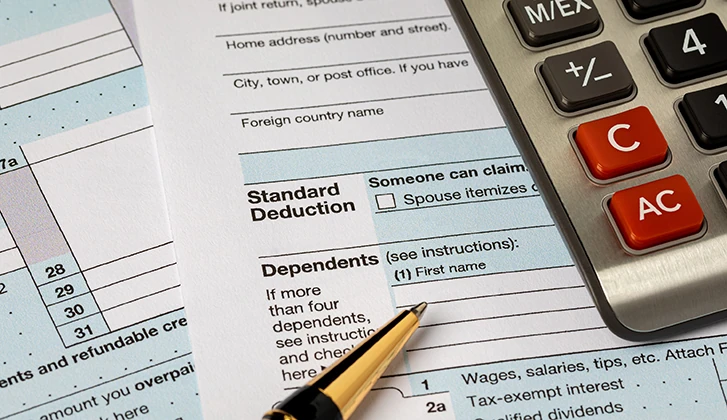NOTICE: Internet Explorer was retired by Microsoft on June 15th, 2022 and is no longer supported. This could change how you access Online Banking.
During scheduled system maintenance from Saturday, March 22 at 7:00 PM to Monday, March 24 at 1:00 PM, our Bill Pay service will be unavailable.
25 Business Tax Deductions You Don’t Want to Overlook

For individuals and businesses alike, paying income taxes is a fact of life.
The good news is that business owners can deduct a wide range of expenses to reduce their overall tax burden.
The IRS stipulates that a business expense must be both ordinary and necessary to be deductible: “An ordinary expense is one that is common and accepted in your industry. A necessary expense is one that is helpful and appropriate for your trade or business.”
In other words, what is or isn’t an allowable write-off may depend on your specific circumstances – and it’s vital to consult an experienced business accountant who can help you maximize your deductions while staying within the law.
Meanwhile, we’ll share 25 common tax deductions – listed in alphabetical order – that your business may be entitled to claim:
1. Advertising and Marketing: Expenses associated with marketing your business, like website development, billboards, and business cards, are generally deductible.
2. Bad Debt: If you sell on credit or make business-related loans, you may be able to write off receivables you can’t collect.
3. Banking and Financing Fees: These can include monthly maintenance fees on deposit accounts, annual fees or transaction fees on credit cards, and loan origination fees.
4. Charitable Contributions: Cash and in-kind donations to 501(c)(3) nonprofit organizations are deductible up to specified annual limits.
5. Contracted Labor: Payments to freelancers can be written off as long as you provide IRS Form 1099-NEC to anyone you pay more than $600 in a tax year.
6. Employee Compensation: Wages, bonuses, and commissions are normally deductible, but remember that sole proprietors and partners aren’t employees. Your accountant will know how compensation should be treated in these cases.
7. Equipment and Vehicles: These are tricky, so review the IRS’s rules regarding when you can fully deduct equipment the year you purchased it and when you should depreciate it over a number of years. To learn more, you can start with this online search query: IRS Section 179 deductions and de minimis rules for equipment purchases.
8. Fringe Benefits: Health insurance premiums, retirement plan contributions, education assistance, and employee discounts are generally deductible.
9. Furnishings and Fixtures: Items like desks and chairs usually fall under de minimis or Section 179 provisions and can be fully deducted the year you buy them.
10. Gifts and Awards: Small presents or prizes given to employees or clients are generally deductible up to the IRS limit of $25 per person per tax year.
11. Home Office Space: If part of your residence is used exclusively for business purposes, you can take a standard or itemized deduction based on square footage.
12. Insurance: Premiums for general and professional liability, property, auto, and workers’ compensation insurance can usually be written off.
13. Inventory: Wholesale stock, raw materials, and related expenses are calculated into the cost of goods sold (COGS), which is deductible when corresponding sales are made.
14. Licenses and Credentials: If you need a license, permit, certification, or professional membership to do business, it’s almost always a deductible expense.
15. Loan Interest: If the underlying asset or purchase is for business use, the portion of any loan or credit card payment that services interest should be deductible.
16. Office and Retail Space: If you rent, you can generally deduct the full amount plus utilities, and if you own, you can generally deduct mortgage interest plus utilities.
17. Professional Fees: These can include fees paid to lawyers, accountants, consultants, financial advisors, appraisers, staffing agencies, and marketing firms.
18. Repairs and Upgrades: If your delivery van breaks down, your roof leaks, or you need to make safety or accessibility upgrades, these expenses can be deducted.
19. Restaurant Meals: Whether you’re grabbing a bite on the road or entertaining clients over lunch or dinner, up to 50% of the bill is deductible.
20. Subscriptions: Software, data storage, web hosting, IT services, and professional periodicals may be essential and deductible business expenses.
21. Supplies: You can typically write off goods used within the year and other necessities like staplers, hand tools, and coffee makers.
22. Taxes: State, sales, property, payroll, and excise taxes are generally deductible, and 50% of self-employment taxes can typically be deducted from your federal income taxes.
23. Telecommunications: Phone and internet plans are usually deductible in proportion to their use for business versus personal purposes.
24. Training and Development: Workshops, conferences, classes, and books may be deductible if they directly relate to your business operations or industry.
25. Travel: Fuel, airfare, lodging, carfare, car rentals, and mileage on personal or business-owned vehicles are common deductible expenses.
Seek Expert Advice
Remember, we strongly recommend consulting a business accountant when it comes to deductions. Deductions are a vital part of the tax prep process and your overall financial strategy. If you don’t take all the deductions you’re entitled to, you’re leaving cash on the table. But claiming deductions that aren’t allowable can result in penalties and even legal trouble. That’s why tax professionals who have experience working with small businesses are often well worth the cost.
Content is for informational purposes only and is not intended to provide legal or financial advice. The views and opinions expressed do not necessarily represent the views and opinions of WesBanco.
While we hope you find this content useful, it is only intended to serve as a starting point. Your next step is to speak with a qualified, licensed professional who can provide advice tailored to your individual circumstances. Nothing in this article, nor in any associated resources, should be construed as financial or legal advice. Furthermore, while we have made good faith efforts to ensure that the information presented was correct as of the date the content was prepared, we are unable to guarantee that it remains accurate today.



